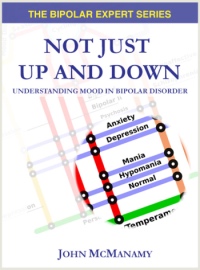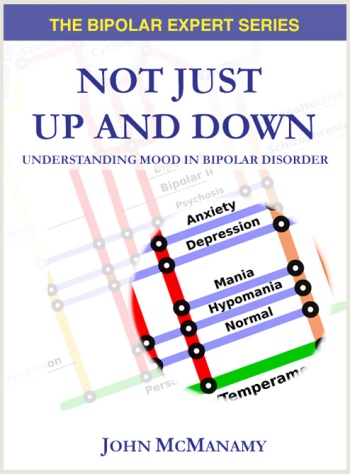What's in YOUR Depression?
 |
What if you return to normal, only to discover depression IS your true normal?
|
Depressive Personality Disorder. Say you are dealing with depression. In all likelihood, you are thinking that your depression is an alien invader that is robbing you of your personality. But what if miserable is your true baseline?
Why this is important is that medications are designed to treat an illness, not change a personality. An article by some prominent academics on the blog site of author Todd Finnerty PsyD makes a case for the diagnosis of Depressive Personality Disorder (DPD). I had occasion to hear one of the authors, Michael Bagby MD of the University of Toronto, at the 2006 American Psychiatric Association annual meeting in Toronto.
My New Book!

Purchase now.
Depression and Personality
Historically, according to Dr Bagby, minor depression was thought to exist on a spectrum with personality, and "may define a group who are pessimistic, disaffected, and frustrated, perhaps because they see their illness as an intractable and enduring part of their selves."
According to the authors of the blog article: “Depressive personality disorder is not simply a variation of normal psychological functioning.” It is an illness, distinct from major depression and dysthymia.
Appendix B to the DSM-IV lists DPD as “worthy of further study,” but is not included in the main text. The appendix defines DPD as “a pervasive pattern of depressive cognitions and behaviors.” By contrast, classic Axis I DSM major depression is described as an “episode,” with symptoms lasting at least two weeks, while minor depression (dysthymia) is regarded as “chronic” (two years or more).
In other words, if you are undergoing major or minor clinical depression right now, all those around you - including your psychiatrist - assume your brain will eventually boot back up to “normal.” But with DPD, you may already be imprisoned in your own version of “normal.”
According to the authors of the article, a number of studies validate DPD, but the obvious overlap with clinical depression, in particular dysthymia, poses major problems. The authors argue that it is dysthymia that suffers from redundancy, not DPD. DSM dysthymia, they contend, comes across as major depression lite, with nearly the same symptoms but with an arbitrarily-added two-year requirement.
DPD, by contrast, serves up a different symptom list, namely:
- Usual mood is dominated by dejection, gloominess, cheerlessness, joylessness, unhappiness
- Self-concept centers around beliefs of inadequacy, worthlessness, and low self-esteem
- Is critical, blaming, and derogatory toward self
- Is brooding and given to worry
- Is negativistic (passive-aggressive), critical, and judgmental towards others
- Is pessimistic
- Is prone to feeling guilty or remorseful
But the real turf DPD may be encroaching on may involve the personality disorders (such as avoidant personality disorder). In particular, there are issues regarding the Five Factor Model (FFM), which is to personality testing what Simon is to American Idol.
The FFM has been influencial in working toward a “hybrid” system of classifying personality disorders, away from the current DSM “categorical” schema. Categories work (to a point) for Axis I disorders. In other words, depression is different from schizophrenia. (Never mind that depressed people can have psychosis and those with schizophrenia can be depressed - that is for another piece.)
Separating Axis II personality disorders, however, is extremely problematic, where there is considerably greater overlap across categories (such as where borderline meets antisocial meets narcissism). A “dimensional” schema not only acknowledges the overlap, but takes into account degrees of severity. As a speaker explained at a conference I attended a few years back: We all have blood pressure. But we have reliable tests to ascertain when our blood pressure is too high.
Think of the FFM as a blood pressure test. The “big five” traits it measures include openness, conscientiousness, extraversion, agreeableness, and neuroticism. A person who passes with flying colors is one who is not likely cave into fear, has his or her shit together, lights up a room, cares about others, and doesn’t readily fly off the handle.
If you were to see these qualities in someone on eHarmony, you would immediately propose marriage to this individual, sight unseen. If for some reason, you failed to initiate contact, you are probably emotionally tied up in knots.
The FFM may crack your case, but here’s the rub. Suppose the results revealed a “neurotic” temperament. According to the authors of the blog article, neuroticism is a pretty airy-fairy term that also embraces other emotions such as anger and anxiety.
It could be you fail to pursue an eHarmony lead because your inner critic is working overtime. You consider yourself worthless. You’re beating yourself up. And now you’re alone and socially isolated. How does that make you feel? Well, depressed.
Okay, suppose you do have a depressive temperament. Does that mean you have DPD? Absolutely not. The authors of the article point out that DPD has a dimensional component, which means we are asking “how much?” So, if you’re the type who prefers staying home alone with a book to going out dancing, you can relax. You may be a lot happier and better adjusted than Joe Cool and Miss Congeniality.
But even if you have been thinking that black is the new pink your entire life, the experts remind us that although our traits are inherited they are not necessarily deterministic. Turning our lives around may not be easy, but we can change, or at least come up with adaptive responses.
The authors contend that DPD should be included in the DSM-5, under personality disorders. The work group investigating the issue decided not to make room for DPD on the basis that this kind of depression is not necessarily incapacitating. In other words, it's perfectly all right to stay home reading a book, even thinking dark thoughts.
In the final analysis, we alone are our own judges. Illness or personality? Perhaps a bit of both? We can’t afford to wait for someone else to ask these questions.
Also check out: Is Crazy Your True Normal? * Depressed or Thinking Deep
Jan 5, 2011
 |
More articles on behavior. |




